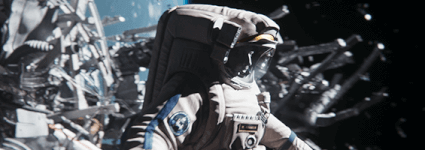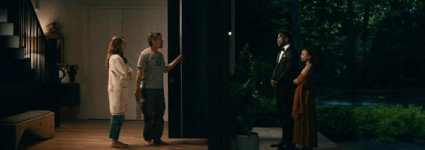Seeking a Friend for the End of the World offers a unique, heartfelt perspective on the apocalyptic genre by blending romantic comedy with dramatic undertones. Directed by Lorene Scafaria and starring Steve Carell and Keira Knightley, the film imagines a world just weeks away from total destruction as a massive asteroid hurtles toward Earth. When society’s last hopes fade, Dodge (Steve Carell), an insurance salesman facing the end alone, forms an unlikely friendship with his vibrant neighbor Penny (Keira Knightley). Together, they embark on a spontaneous road trip through a world in chaos, each hoping to reunite with loved ones and find closure before time runs out. Their journey is filled with humorous, touching, and surreal encounters, emphasizing the importance of connection, forgiveness, and self-discovery as humanity faces extinction.
Future World transports viewers to a harsh post-apocalyptic wasteland, where the remnants of humanity struggle for survival after a devastating global war between humans and machines. Co-directed by James Franco and Bruce Thierry Cheung, the film features an ensemble cast including James Franco, Suki Waterhouse, Jeffrey Wahlberg, Lucy Liu, and Milla Jovovich. The story follows Prince (Jeffrey Wahlberg), a young man from a rare oasis, embarking on a risky journey to find a rumored cure for his critically ill mother, the Queen (Lucy Liu). Prince’s odyssey takes him across desolate landscapes teeming with danger, from violent biker gangs led by the ruthless Warlord (James Franco) to the enigmatic android Ash (Suki Waterhouse), who begins to question her own programming. Along the way, Prince faces betrayals, shifting alliances, and the ever-present threat of extinction while powerful characters like the sinister Druglord (Milla Jovovich) complicate his desperate mission.
Arcadian is a post-apocalyptic sci-fi thriller that brings a fresh, intimate spin to end-of-the-world survival stories. Directed by Benjamin Brewer and starring Nicolas Cage, Jaeden Martell, and Maxwell Jenkins, the film follows Paul and his twin teenage sons, Thomas and Joseph, as they struggle to endure in a world devastated by an unspecified catastrophe. Their lives center around a remote farmhouse, where danger lurks every night: terrifying, intelligent creatures emerge at sundown, forcing the family to rely on fortified defenses and their wits to stay alive. As the mysterious nocturnal predators grow bolder and begin orchestrating complex attacks—digging under homes and wiping out neighboring survivors—Paul and his sons face escalating threats that test the strength of their bond. When tragedy strikes and survival depends on split-second decisions, each family member must confront their fears and make sacrifices that will determine not just their fate, but possibly that of humanity itself.
A father who works on a space station must save his 15-year-old daughter after a catastrophic meteor shower strikes Earth. Armed with only satellite phones and cameras, he embarks on a thrilling journey to rescue her.
The paradox of apocalyptic thrillers, especially when adding irony to the mix, is that criticism and warning can turn into catharsis and, eventually, into frivolity. Written and directed by Sam Esmail (creator of the series Mr. Robot) based on the novel of the same name by Rumaan Alam, Leave the World Behind belongs to the select club of films with that effect, like Don't Look Up or The Menu in recent years. The plot follows a couple (Ethan Hawke and Julia Roberts) from New Jersey who, on a vacation with their children to Long Island, experience a series of disturbing events and the arrival of George Scott (Mahershala Ali) and his daughter (Myha’la), the owners of the house they are staying in. Distrusting each other and cut off from the rest of the world, both families must confront what, at every moment, seems more like an existential threat. It functions as an entertaining and well-acted thriller that will give you a great time, although it is not as deep as it pretends to be.




